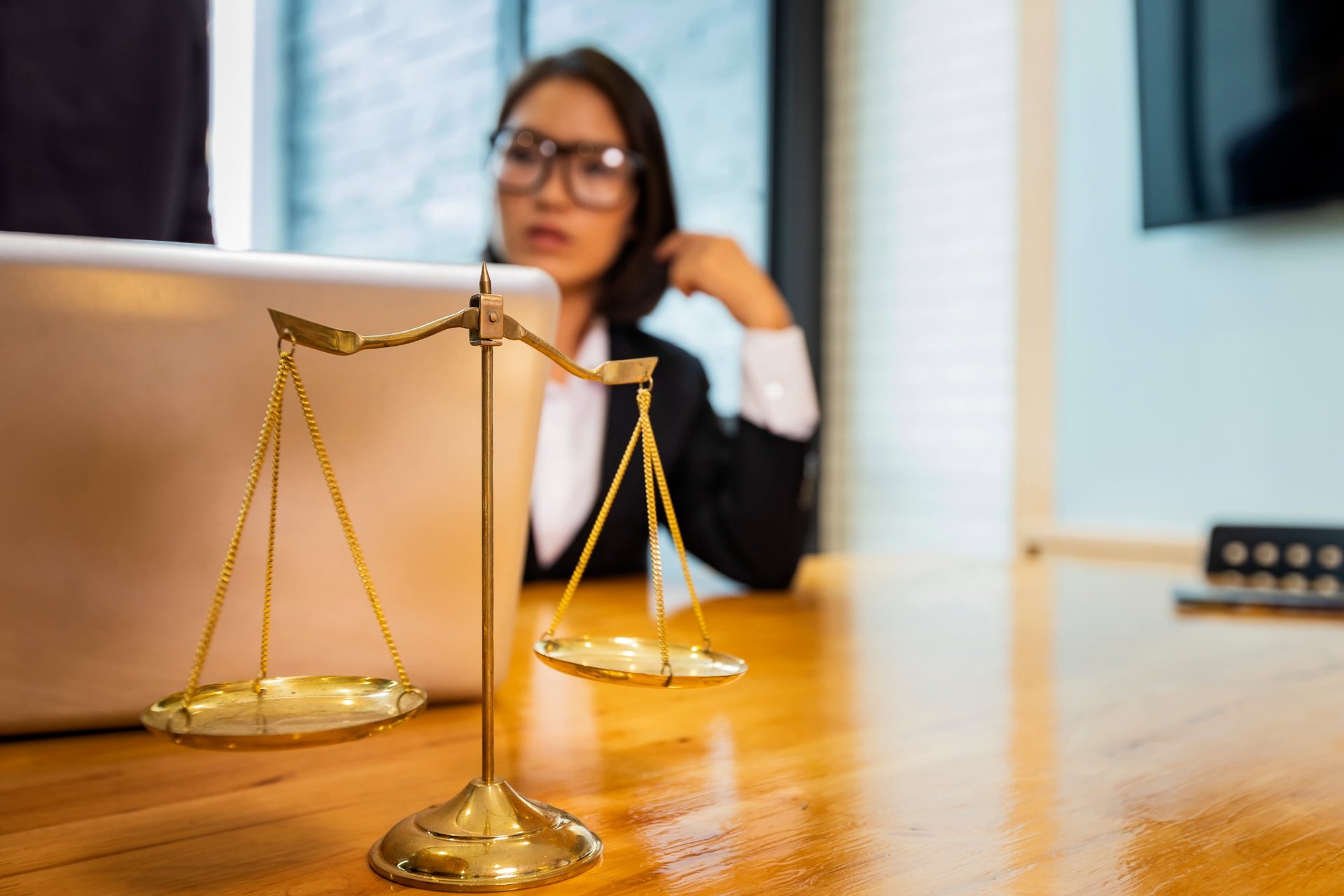On Point for You – When It Matters Most
When false and damaging statements threaten your business’s reputation, the financial and reputational consequences can be devastating. A single defamatory post on social media platforms can spread like wildfire, causing a decline in sales and lost business opportunities that may take years to recover from.
Maryland, Virginia, and Washington D.C. each have specific legal nuances surrounding defamation law that affect how businesses can pursue legal action.
Our experienced Maryland defamation attorney team helps businesses manage the complexities of defamation law and protect their reputation when it matters most.
Defamation Defined
Defamation involves the publication of false statements that harm another party’s reputation, causing financial loss or reputational damage to individuals or businesses. Business defamation specifically targets companies, their products, services, or business practices through libel (written statements) or slander (spoken statements).
These damaging statements can cause irreparable harm to a company’s standing in the marketplace and lead to significant financial consequences.
The legal definition requires that a defamatory statement be communicated to someone else, be false, and cause actual harm to the business. Knowing defamation law is essential for business owners who need to protect their brand from false claims that could undermine years of hard work and investment.
⚖️ The constitutional balance between First Amendment protections and defamatory speech creates complex legal terrain. Courts must weigh free speech rights against the legitimate business interests in maintaining reputation, often citing precedent from the Supreme Court’s New York Times Co. v. Sullivan decision that established different standards for public and private figures.
Maryland follows common law defamation principles codified in Maryland Courts and Judicial Proceedings Code Section 5-105, Virginia operates under common law principles codified in Virginia Code Title 8.01-247.1, and Washington D.C. applies its own statutory framework under D.C. Code Section 12-301(4).
Each jurisdiction has slightly different requirements for proving damages in defamation claims, making local legal counsel essential for any potential defamation case.

Types of Defamation
Getting to know the various types of defamatory statements helps business owners recognize when they may have grounds for a defamation lawsuit. Each category carries different legal implications and potential remedies under business law.
Libel
Libel encompasses written defamatory content published in newspapers, magazines, websites, emails, or social media posts. In the digital age, libel has become increasingly common as false information spreads rapidly across online platforms. Written statements often carry more weight in legal proceedings because they create permanent records of the defamatory material.
Business libel frequently appears in online reviews, blog posts, or social media content where competitors or disgruntled customers make false statements about a company’s practices, products, or services. The permanent nature of written content means that libel can cause ongoing reputational harm long after initial publication.
Maryland courts presume damages in defamation per se cases when actual malice is proven, while Virginia and D.C. may require more specific evidence of financial harm. This jurisdictional difference affects litigation strategies and potential compensation.
Slander
Slander refers to spoken defamatory statements made in conversations, presentations, or broadcast media. While traditionally harder to prove due to lack of permanent records, modern technology often captures slanderous statements through recordings or witness testimony.
Business slander might occur during industry conferences, networking events, or media interviews where false claims about a company’s operations or integrity are voiced publicly. The temporary nature of spoken words doesn’t diminish their potential for causing substantial reputational damage.
Hypothetical Example: A competitor falsely telling potential clients at a D.C. tech conference that a software startup engages in fraudulent billing practices, causing immediate loss of business relationships.
Trade Libel
Trade libel specifically targets a business’s products or services with false statements designed to harm commercial interests. This type of defamation focuses on the quality, safety, or effectiveness of what a company offers rather than attacking the business’s general reputation.
Trade libel cases often involve competitors making false claims about product defects, safety issues, or performance problems that don’t actually exist. These statements directly impact purchasing decisions and can lead to immediate financial losses.
Virginia’s commercial disparagement laws provide specific protections against trade libel under Virginia Code Title 8.01, while Maryland and D.C. address these issues under broader defamation statutes. The distinction affects available remedies and damage calculations.
Defamation Per Se
Defamation per se involves statements so inherently damaging that courts presume harm without requiring specific proof of financial loss. These typically include false accusations of criminal activity, professional incompetence, or moral turpitude that would damage any business owner’s reputation.
Maryland law presumes damages in defamation per se cases when actual malice is established, making it easier for businesses to pursue legal action without extensive financial documentation. Virginia and D.C. maintain similar presumptions but with different procedural requirements.
Hypothetical Example: A former employee falsely posting on LinkedIn that a Maryland consulting firm systematically discriminates against minorities in hiring, constituting defamation per se due to implications of illegal business practices.
Our Washington D.C. defamation lawyer team has extensive experience helping businesses respond effectively to online attacks and false accusations.
Business Defamation Examples
Realistic scenarios help illustrate how defamation issues manifest in business contexts and the potential consequences companies face when targeted by false claims.
A former employee might post false accusations on social media claiming workplace harassment or discrimination that never occurred, causing prospective employees to avoid the company and clients to question its integrity. These posts can go viral quickly, amplifying the reputational harm exponentially.
Competitors sometimes engage in corporate espionage or spread false information about a rival’s financial stability, regulatory compliance, or customer service quality. Such tactics aim to redirect business opportunities while causing both immediate and long-term damage to the targeted company.
⚠️ Online defamation spreads faster than ever before, and delayed responses often worsen the damage. Swift legal action combined with reputation management strategies can help mitigate the worst effects of defamatory content.
Customer disputes occasionally escalate into defamatory attacks when individuals make false claims about product quality, safety issues, or business practices on review platforms or social media. While legitimate complaints deserve attention, fabricated allegations require legal intervention to prevent further harm to the business.
Can a Company Sue for Defamation?
Yes, businesses can absolutely file a defamation lawsuit when false statements cause demonstrable harm to their reputation or financial standing. Companies have the same rights as individuals to protect themselves against defamatory statements made by competitors, former employees, customers, or other parties.
To succeed in a business defamation claim, companies must prove four essential elements: a false statement of fact was published, the statement was communicated to third parties, it caused actual harm to the business, and the person making the statement acted with at least negligence in determining its truth.
The legal process varies significantly between Maryland, Virginia, and Washington D.C. In D.C., punitive damages may be available in cases involving actual malice, while Virginia limits punitive damages unless clear evidence of malicious intent exists. Maryland caps non-economic damages in certain tort cases under Maryland Courts and Judicial Proceedings Code, which can affect total compensation in defamation suits.
⚖️ Legal thresholds for proving business defamation vary by jurisdiction, making experienced local legal counsel essential for evaluating potential claims and developing effective litigation strategies.

Defamation of a Business on Social Media
Social media platforms have revolutionized how defamatory content spreads, creating unprecedented challenges for businesses trying to protect their reputation online. A single false post can reach thousands of people within hours, causing immediate and lasting damage to a company’s standing.
The anonymous nature of many social media accounts complicates efforts to identify and hold accountable those making false statements. However, legal remedies exist for businesses willing to pursue them through proper channels and with appropriate legal guidance.
Most platforms have established procedures for reporting defamatory content and requesting takedowns. Google Business Profile allows businesses to flag inappropriate reviews, Facebook provides mechanisms for reporting false posts, and other platforms maintain similar systems for addressing violations of their terms of service.
Hypothetical scenario: A false viral Google review claims a Virginia restaurant uses expired ingredients, causing immediate reservation cancellations and long-term trust issues despite the accusation being completely fabricated by a competitor.
When platform-based solutions prove insufficient, businesses can pursue legal action including cease-and-desist letters, subpoenas for user identification, and formal defamation lawsuits. The legal process for subpoenaing platform records varies between Maryland, Virginia, and D.C., with each jurisdiction having specific procedures for compelling disclosure of anonymous user information through their respective court systems.
| Platform | Can businesses request takedown? | What proof is needed? | Link to complaint form |
|---|---|---|---|
| Yes | Written documentation | Google Business Profile Help | |
| Yes | Legal process required | Meta Report Content | |
| Yelp | Yes | Violation of terms | Yelp Content Guidelines |
Truth is a solid defense against defamation claims, which is why documenting the falsity of statements becomes essential for businesses pursuing legal remedies. Maintaining detailed records of business practices, customer interactions, and factual information helps establish the defamatory nature of false accusations.
Our Virginia defamation lawyer understands how to go through the complexities and protect your business from ongoing reputational harm.
How to Respond to Business Defamation
When facing defamatory attacks, businesses must respond strategically to minimize damage while preserving their legal rights and options for future action.
- Preserve all evidence – Screenshot defamatory posts, save URLs, and document timestamps before content potentially disappears or gets modified.
- Consult experienced legal counsel – Knowing the complexities of defamation requires professional guidance to evaluate claims and develop appropriate response strategies.
- Avoid retaliatory statements – Responding emotionally or making counter-accusations can escalate conflicts and potentially create liability for the business.
- Send professional cease-and-desist letters – Formal legal demands often resolve matters without costly litigation while establishing the business’s serious intent to protect its reputation.
- File suit when appropriate – Some situations require formal legal action to secure adequate remedies and prevent ongoing harm.
The legal nuances in each jurisdiction affect response strategies. Maryland’s presumption of damages in defamation per se cases may support more aggressive legal action when actual malice is proven, while Virginia’s emphasis on proving specific harm might require more detailed documentation of losses.

Reach Out to Our Firm for Defamation Support
Flood Law LLC provides comprehensive legal representation for businesses facing defamation challenges throughout Maryland, Virginia, and Washington D.C. Our experienced team understands the unique pressures business owners face when their reputation comes under attack and the financial consequences that can result from unchecked defamatory statements.
We help clients understand the legal options available, develop effective response strategies, and pursue appropriate remedies through negotiation or litigation. Our approach combines aggressive legal advocacy with practical business advice to safeguard our clients’ interests while minimizing disruption to their operations.
Call our experienced defamation attorneys at (240) 403-2619 or contact us online today to discuss your situation and learn how we will help protect your business’s reputation.

FAQs
How do I prove a defamation claim against my business?
Proving business defamation requires establishing four key elements: the statement was false and factual rather than opinion, it was published to third parties, it caused actual harm to your business, and the speaker acted negligently or maliciously. Documentation of financial losses, customer reactions, and the statement’s falsity strengthens your case significantly.
Can I sue if someone leaves a false negative review about my company?
Yes, if the review contains false factual statements that damage your business rather than expressing genuine opinions about customer experience. However, distinguishing between protected opinion and actionable defamation requires careful legal analysis of the specific language used and the context of the statements.
What’s the difference between an opinion and defamation?
Opinions represent personal judgments and receive First Amendment protection, while defamatory statements present false facts as truth. Saying “I think their service is terrible” expresses opinion, but claiming “they overcharge customers illegally” states a verifiable fact that could constitute defamation if false and damaging.
How long do I have to file a defamation lawsuit in Maryland, Virginia, or D.C.?
Maryland provides a one-year statute of limitations for defamation claims under Maryland Courts and Judicial Proceedings Code Section 5-105, Virginia allows one year from publication under Virginia Code Section 8.01-247.1, and Washington D.C. permits one year from when the defamatory statement was made under D.C. Code Section 12-301(4). These tight deadlines make prompt legal consultation essential for preserving your rights and options.
Can your law firm help remove defamatory content from the internet?
We can pursue various legal remedies, including cease-and-desist letters, platform reporting procedures, court orders requiring content removal, and litigation seeking injunctive relief. While complete removal isn’t always possible, our experienced attorneys will help minimize the visibility and impact of defamatory content while pursuing appropriate legal remedies.

